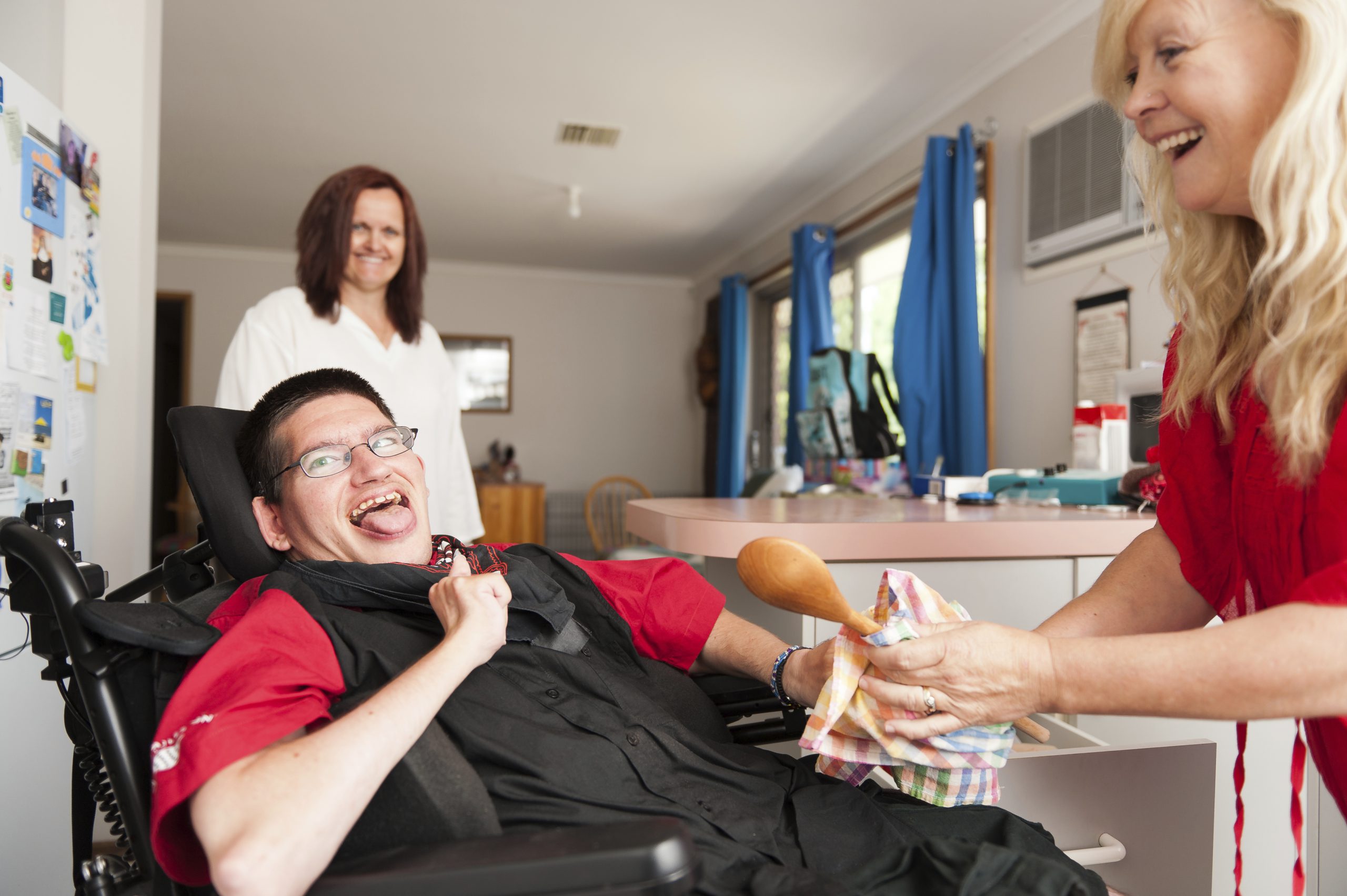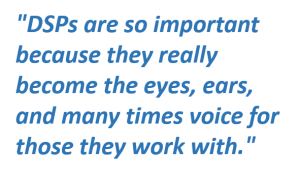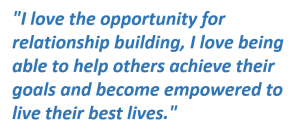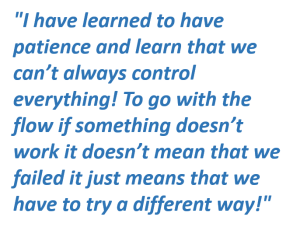
When someone asks me, “what do you do at ViaQuest?” the first words out of my mouth are “we provide services to people with developmental disabilities.” And when I say “we” provide services, what I really mean is our DSPs provide services. So, when you really think about it, DSPs are ViaQuest. They’re the backbone of our company, they’re the heart and soul of what we do.
Now, some of you might be reading this and asking yourself, what is a DSP? What does it stand for? What do they do? Why is there an article written about them? So, we decided that anyone who doesn’t already know what a DSP is should learn. DSP is a crucial, essential job, the work that DSPs do is so important, so we want to tell the world!
Sept. 13 – 19, 2020 is National DSP Appreciation Week so we figured, no better time than now to talk about DSPs, to share their words and the words of their colleagues, and educate the world on the value of DSPs.
What is a DSP?
DSP stands for Direct Support Professional and in very limited and simple terms, a DSP is someone who provides support and services to a person with developmental disabilities. These services could include hygiene assistance, transportation, emotional support, budgeting assistance, food preparation, and the list goes on and on.
So, we’ve gotten the technical explanation out of the way, let’s talk about what a DSP really is. We asked the managers and colleagues of our DSPs at ViaQuest to tell us, what do you think a DSP is? And here are just some of the words they used: Kind, Compassionate, Courageous, Dedicated, Resilient, Role Models, Heroes. DSPs are all these things and we see it every day.
We see kindness when a DSP wakes up early before their shift to go grocery shopping for an individual because they want to make sure they get all their favorite foods. We see Compassion when a DSP reaches out and holds the hand of an individual who’s feeling overwhelmed or alone. We see Dedication when a DSP paints an individual’s nails and does their makeup because they want to look and feel their best. We see Courage and Resilience when a DSP returns to work today despite an extremely difficult and challenging yesterday. We see Role Models when a DSP leads by example and displays excellence. And for all those reasons, we most certainly see Heroes, every day.
Why is the DSP job so important?
We also asked our managers and colleagues at ViaQuest to tell us, why are DSPs so essential to what we do? Here are their words:
“DSPs are so important because they really become the eyes, ears, and many times voice for those they work with.”
“If the pandemic has taught us anything in our work, it has taught us that DSPs don’t stop no matter what. The love and passion our DSPs have shown our individuals during these hard times is no less than incredible.”
“DSPs are so important because more often than not, they are the connection to the outside world for those in our care. They also serve as an extension of the person we are taking care of, being their voice, their advocate, and sometimes their only way to move around in this world. What a noble decision to take on this responsibility and to do it right!”
“I think DSPs are very important because they are like the individual’s second family sometimes the only family, they see them every day in their life, build relationships with the individuals, and build that trust and become a family.”
“DSPs are important to me because they are the backbone of what we do. They wear many hats; from transportation specialists, to cook, to community guide, to goals facilitator, and everything in between. They are the frontline for the people we serve, the ones our individuals rely on every single day to have a happy, healthy, successful life. Without DSPs, an entire population of people would remain in the shadows. Our DSPs put in long hours and a lot of blood, sweat, and tears to ensure the people we serve have the life they deserve.”
Why are you a DSP?
Being a DSP isn’t a straight forward or simple job, in fact, sometimes it can be a dangerous job, a frustrating job and it is almost always a challenging job. Being an advocate, health aide, counselor, driver, cook, friend, family member and more can be so incredibly rewarding, but also completely exhausting and frustrating somedays. So, why would anyone want to be a DSP?
We asked our ViaQuest DSPs why they choose to be a DSP and we received an overwhelming amount of beautiful responses. Many of our DSPs simply said, “I like helping people,” others spoke of their empathy and understanding what it’s like to experience hardship and fear, and some DSPs explained that the people they serve have become their family and so, like family, they’re dedicated to caring for them.
Our DSPs had so many amazing things to say about the work they do, about this job that has become their life’s passion. This is what some of our DSPs had to say, in their own words:
“I love the opportunity for relationship building, I love being able to help others achieve their goals and become empowered to live their best lives.”
“When I moved to the United States in 2013, my first job was working with people with a developmental disability. I immediately fell in love with the job, I feel and have a passion for the people we serve. I have always seen m yself and any of my relatives in their shoes.”
yself and any of my relatives in their shoes.”
“I’m indebted to the ones trying the hardest to make it in the world. I owe it to the people that didn’t make it through life struggles.”
“I love being able to show someone that they can do just about anything that a lot of people counted them out on. From teaching them how to cook, to being able to express themselves in a way that is safe is amazing.”
“The reward is so much more, seeing people light up in this world with excitement is probably the greatest part.”
“They deserve to have a staff make them big holiday meals. They deserve to be able to go on outings and be able to participate just like everyone else and not stand to the side like they don’t belong.”
“I have a cousin with disabilities, I helped him learn how to read and write. I don’t look at the people I work with as different, we are all just human.”
“I am drawn to the challenge of those clients who struggle to voice their needs. My favorite part of the job is making that “Connection”. Many of our individuals communicate in nonverbal ways or stumble putting their words together. When you see their eyes light up, hear their laughter or they reach for me the “AHH”, moment “I have made the connection! I have heard their ‘voice’.”
“After my aunt died of schizophrenia, I vowed to protect and take care of those with mental and behavioral health problems. The world may not understand but I do. When I walk through that door and I’m able to make my clients smile, that’s my why. That I’m able to give them a normal life, I know I’ve found my purpose in life. It warms my heart and I live for this.”
“In 2010 I was diagnosed with liver cirrhosis and spent 6 months in a nursing home unable to do anything for myself. People had to feed me and I needed assistance for all my personal hygiene. In 2011 I had a liver transplant that saved my life. In 2014, I lost my job managing a pizza shop. Two days later I was offered a job working with people with developmental disabilities. It seemed like the perfect opportunity to pay forward for what was done for me. I consider myself fortunate, I get to help others as I was once helped.”
What is the Greatest Lesson You’ve Learned as a DSP?
We’ve talked a lot about everything a DSP does and is, how they go above and beyond to serve people with developmental disabilities, but do the people they serve, serve them? The answer is absolutely yes. Our DSPs spend a lot of time supporting and teaching individuals with developmental disabilities, but our DSPs feel they’ve learned just as much as they’ve taught. We asked our DSPs, what is the greatest lesson you’ve learned from being a DSP? Here’s what they had to say:
“I have learned to have patience and learn that we can’t always control everything! To go with the flow if something doesn’t work it doesn’t mean that we failed it just means that we have to try a different way!”
“The greatest thing I’ve learned as a DSP is that teamwork makes the dream work.”
“I’ve learned to listen and then respond better to situations with not only the Individuals I serve but my coworkers as well. Stop, think, breath helps tremendously when under pressure.”
“That this group of people needs to be treated like we would treat our children or family. After all, they are our extended family. They need hugs, told they are doing a great job, thank them for their help, and any other kind words/actions that we would do or say to our children.”
“I’ve learned is that these people are fighters and the most loving people I’ve ever encountered in my life.”
“I have learned that everyone has a talent and a different way of seeing things. The idea we have about how certain things should be or look is different for each person. And none of them are wrong, they are just different!”
“The greatest thing I’ve learned by becoming a DSP is compassion! Compassion for another human, putting their needs first! Seeing the world through their eyes, opened my eyes to see the good in the world.”
“I would say over the years, I have learned so much, not just about clients with special needs, but also about myself. They’ve had more Grit then I have ever had. Seeing real people overcome through life struggles with smiles without complaint.”
The invaluable lessons our DSPs have learned from the people they serve extends far beyond the hours they spend working. These lessons shape who our DSPs are, and our DSPs carry these lessons with them throughout their professional and personal lives. Our DSPs are grateful to the people they serve for giving them opportunities, every day, to grow, learn, and share the gifts and lessons they’ve learned along the way.
At ViaQuest, our DSPs are kind, compassionate, courageous, dedicated, resilient, role-model heroes and many people in this world can truly say, I don’t know where I’d be without them. Our DSPs are the foundation of ViaQuest, a company who employs and serves thousands of people. Where would I be without our DSPs? I really don’t know, but I know I wouldn’t be here writing this article. The opportunities I’ve experienced at ViaQuest are because of our DSPs and the people they serve. So, I’m certain I speak for everyone at ViaQuest and everyone in our industry when I say, thank you. Thank you to all the DSPs who selflessly serve day in and day out to create opportunities, not only for the people they serve but for all of us.
Written by Alex Swogger
HR Administrator at ViaQuest Inc.


 yself and any of my relatives in their shoes.”
yself and any of my relatives in their shoes.”
